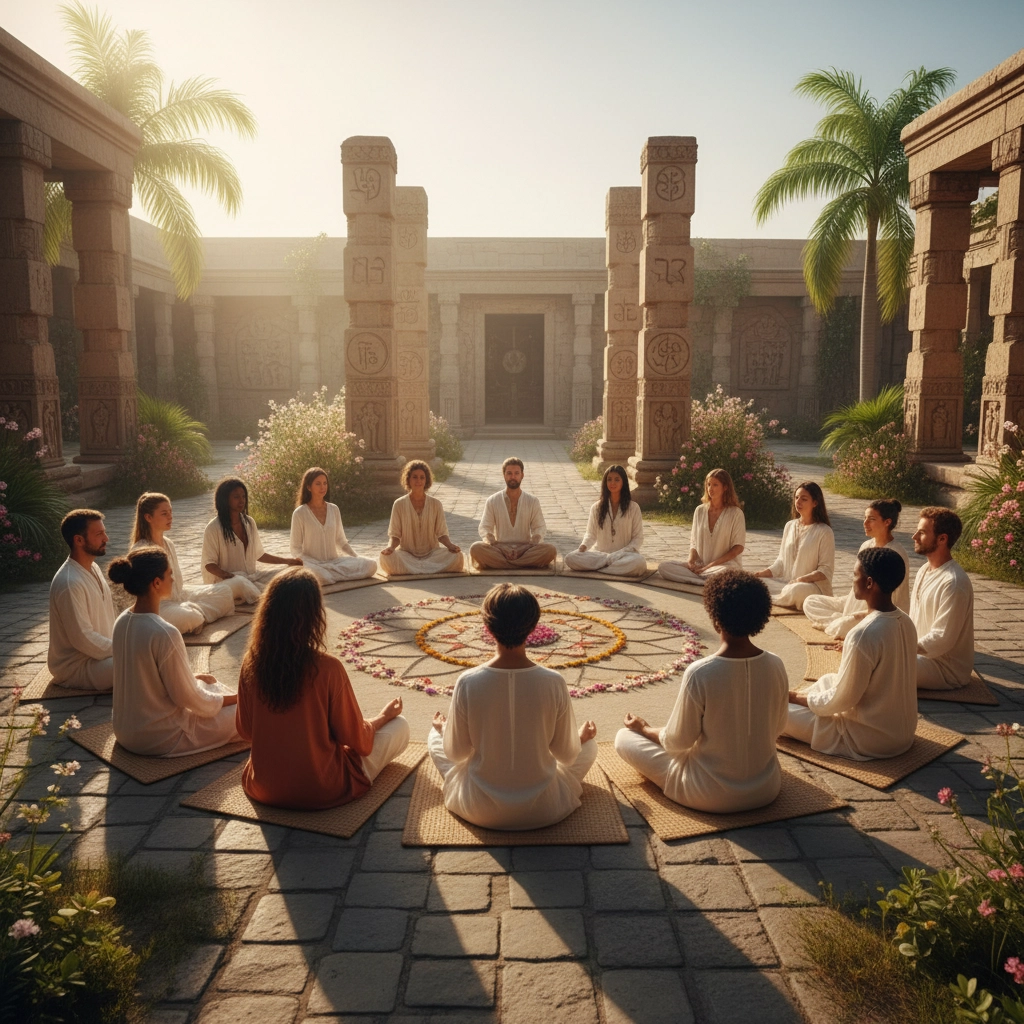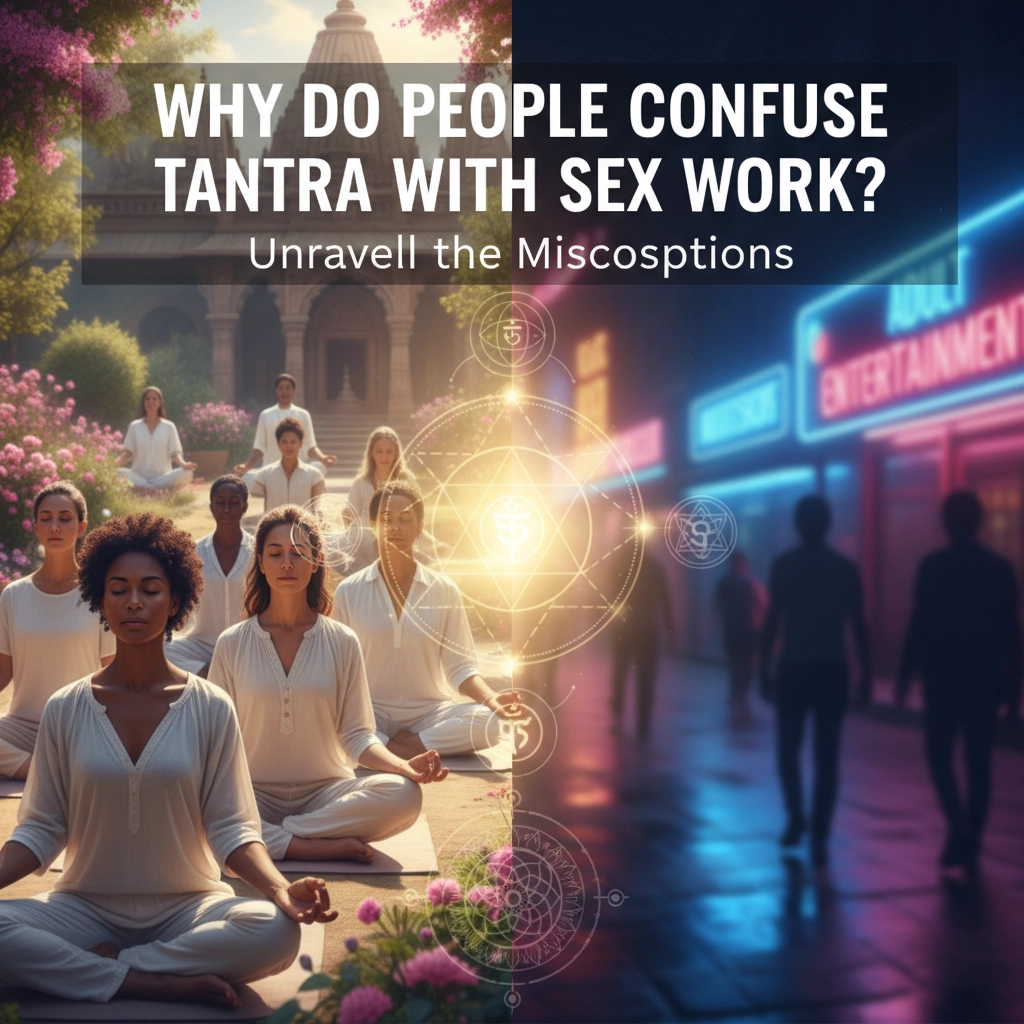Let's get real about something that's been bugging the spiritual community for years. Walk into any conversation about tantra, and you'll probably watch someone's eyebrows raise with that "oh, that kind of spiritual practice" look. Google "tantra" and you'll get flooded with ads for "tantric massage" and "sensual healing sessions." So what's the deal? Why do people immediately think tantra equals sex work?
The answer isn't simple, but it's important to understand if you're serious about authentic spiritual practice.
The Great Western Misunderstanding
Here's the thing most people don't realize: traditional tantra has about as much to do with sex work as yoga has to do with gym membership sales. Both involve the body, sure, but the intentions couldn't be more different.
Authentic tantra is an ancient spiritual path focused on self-realization and enlightenment. It's about dissolving the conditioning that keeps you stuck, expanding consciousness, and embracing all aspects of human experience as pathways to the divine. Sexual energy is part of that experience, but it's treated as creative life force energy (called Shakti) rather than something to be consumed or commercialized.
The confusion started when Western culture grabbed hold of tantra and basically turned it inside out. Instead of using sexual energy as a tool for spiritual awakening, the focus shifted to using spirituality as a tool for better sex. Can you see how that completely flips the script?

How Media Screwed Everything Up
Women's magazines didn't help. For decades, they've been publishing articles with titles like "10 Tantric Techniques to Drive Him Wild" or "Tantric Secrets for Better Orgasms." These articles treat tantra like it's just exotic foreplay with some candles and breathing thrown in.
Then came the internet, and things got even messier. Search for tantra online and you'll find a mix of legitimate spiritual content buried under layers of sexualized marketing. "Tantric massage parlors" pop up alongside actual tantric teachers. Dating apps are full of people claiming to practice tantra when they really just mean they like slow, conscious sex.
The result? Most people's first exposure to tantra comes through this heavily sexualized lens, not through authentic spiritual teachings.
The Commercialization Problem
Here's where it gets tricky. Some practitioners genuinely blur the lines by offering services that include physical touch, nudity, and working with sexual energy. On the surface, this can look similar to sex work, especially to someone who doesn't understand the deeper intentions.
But here's the key distinction: intention changes everything.
Sex work primarily focuses on providing sexual pleasure or stress relief. It's transactional – you pay for a sexual service, and you get it. Any healing that happens is usually a side benefit, not the main goal.
Authentic tantric healing, on the other hand, has healing as the primary intention. Practitioners undergo extensive training in trauma-informed practices, understanding psychological triggers, and creating genuinely safe containers for deep work. The goal isn't sexual gratification – it's helping someone heal their relationship with their own life force energy.

The Sexual Energy Confusion
Part of the confusion comes from the fact that tantra does work with sexual energy – but not in the way most people think.
In tantric philosophy, sexual energy isn't just about getting off. It's viewed as the same creative force that animates everything in the universe. This energy can be cultivated and directed toward spiritual expansion, healing trauma, or deepening consciousness.
Traditional tantric practices often involve learning to contain and redirect this energy rather than releasing it through orgasm. The idea is that by working consciously with this powerful force, you can access deeper states of awareness and connection.
Compare that to conventional sex, which tantra describes as often ego-driven and goal-oriented – focused on taking pleasure from another person rather than connecting with the deeper creative force within yourself.
The "Spiritualized Sexuality" Market
There's also a whole market that's grown up around what you might call "spiritualized sexuality." People are hungry for sexual experiences that feel more meaningful than hookup culture, but they don't necessarily want full-on spiritual practice either.
This creates a gray area where practitioners offer "conscious sexuality" work, "tantric intimacy coaching," or "sacred sexuality healing" – services that borrow tantric language and concepts but may not be rooted in traditional tantric practices.
Some of these practitioners are doing valuable work helping people heal sexual trauma or develop healthier relationships with their sexuality. Others are essentially offering upgraded sex work with spiritual terminology. The problem is that it all gets labeled as "tantra," which confuses people about what authentic tantric practice actually involves.

The Historical Context Nobody Talks About
To really understand this confusion, you need some historical perspective. Traditional tantra developed in a completely different cultural context, where sexuality was viewed as sacred rather than shameful or purely recreational.
In ancient tantric traditions, sexual energy was considered divine creative force. Working with this energy was seen as a path to spiritual liberation, not entertainment. The practices were often part of larger spiritual traditions that included meditation, philosophy, ritual, and community.
When these practices were transplanted to Western culture – a culture with a pretty messed up relationship to both sexuality and spirituality – things got distorted. We took the sexual elements out of their spiritual context and either made them taboo or commercialized them.
The Real Distinctions
So how do you tell the difference between authentic tantric practice and commercialized versions? Here are some key markers:
Authentic tantric practice usually involves extensive study of philosophy and meditation, not just sexual techniques. It's about spiritual development first, with sexual practices as one tool among many. Teachers typically have years of training in traditional lineages and focus on consciousness expansion rather than sexual performance.
Commercialized "tantra" tends to focus primarily on sexual techniques and experiences. Marketing emphasizes pleasure, performance, or "healing" through sexual methods. There's often little connection to traditional tantric philosophy or meditation practices.
Sex work labeled as "tantra" uses spiritual language but the primary service is sexual. The goal is pleasure or stress relief, not spiritual development or healing. This isn't inherently wrong – it's just not actually tantra.

Taking Back Authentic Practice
If you're interested in authentic tantric practice, here's how to navigate this confusing landscape:
Look for teachers who emphasize philosophy and meditation alongside any physical practices. Real tantra involves studying texts, understanding cosmology, and developing a meditation practice. If someone's only talking about sexual techniques, that's a red flag.
Ask about lineage and training. Authentic tantric teachers can usually trace their learning back through established traditional lineages. They've studied with qualified teachers for years, not just taken a weekend workshop.
Notice the language being used. Authentic teachers talk about consciousness, energy cultivation, and spiritual development. They're not primarily marketing sexual experiences or promising to fix your sex life.
Start with meditation and philosophy. If you're new to tantra, begin with the foundational practices – meditation, breath work, and studying tantric philosophy. The physical practices make more sense when you understand the bigger picture.
The Path Forward
The confusion between tantra and sex work isn't going away anytime soon. Too much money is being made from sexualized versions of "tantra," and too many people are looking for spiritual bypass solutions to sexual problems.
But for those genuinely interested in authentic practice, the path is still available. It requires discernment, patience, and a willingness to go deeper than surface-level sexual techniques.
Real tantric practice will challenge everything you think you know about spirituality, sexuality, and yourself. It's not a quick fix for bedroom problems or a way to have more exciting sex. It's a complete spiritual path that happens to include working with all aspects of human energy – including sexual energy.
The difference between this and sex work? Everything.
When you understand tantra as a path of consciousness rather than a collection of sexual techniques, the confusion starts to clear up. And that's when the real practice can begin.



